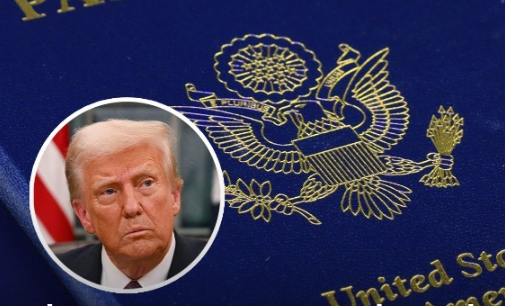President Trump has signed a slew of executive orders since returning to office earlier this week.
One of the executive orders recently signed by President Donald Trump is set to bring significant changes to federal policies, particularly affecting non-binary individuals and their ability to obtain passports reflecting their gender identity. This decision, part of Trump’s sweeping initiatives since his return to the White House, has sparked widespread concern among LGBTQ+ advocates and civil rights organizations.
Trump, who resumed office earlier this week, wasted no time implementing his agenda. Within hours of his inauguration, the president signed over 200 executive orders, targeting a wide range of issues including employment, climate change, and immigration. Among the most controversial of these is an order titled “Defending Women From Gender Ideology Extremism and Restoring Biological Truth to the Federal Government.”
This order has profound implications for non-binary individuals, particularly those who previously benefited from the ability to select an “X” gender marker on their passports—a policy introduced during the Biden administration.
The Executive Order and Its Key Provisions
The executive order enforces a strict binary definition of gender, recognizing only male and female as valid categories based on biological sex assigned at birth. This definition extends to all federal documentation, including passports, birth certificates, and other identification.
Secretary of State Marco Rubio, in an email obtained by The Guardian, outlined the immediate impact of the policy. He stated, “The policy of the United States is that an individual’s sex is not changeable,” and directed staff to ensure that “sex, and not gender, shall be used” on official documents. As a result, all passport applications requesting an “X” gender marker have been frozen, effective immediately.
The new directive includes the following measures:
Suspension of Applications: Any passport application seeking to include an “X” gender marker or requesting a change in the sex marker is to be suspended indefinitely.
Policy Scope: Both current and future applications are affected, although passports already issued with an “X” marker remain valid for now. However, renewing or updating these passports under the new policy is expected to present challenges.
A Reversal of Progress
The policy change marks a stark reversal of the progress made under the Biden administration. In October 2021, the U.S. issued its first passport with an “X” gender marker, a move that was celebrated as a significant step toward inclusivity and recognition of gender diversity. Jessica Stern, the U.S. Special Envoy for LGBTQ+ Rights, hailed the initiative as a way to ensure federal systems reflect the “diversity of gender identity, gender expression, and sex characteristics among U.S. citizens.”
A 2021 survey estimated that 1.2 million Americans identify as non-binary, highlighting the broad impact of the Biden-era policy. For many, the option to select an “X” gender marker on their passports symbolized validation and acknowledgment of their identities. The new directive not only halts progress but also raises concerns about the broader implications for LGBTQ+ rights in the U.S.
Reactions to the Executive Order
The executive order has drawn polarized reactions from various sectors.
Supporters of the Policy
Supporters argue that the move restores clarity and consistency to federal documentation. They claim that recognizing non-binary or alternate gender markers introduces confusion and undermines the integrity of official records.
A Trump administration spokesperson defended the policy, stating, “This is about preserving biological reality in government documentation and protecting the integrity of our systems.”
Criticism from Advocates and Experts
Conversely, LGBTQ+ advocates and civil rights groups have condemned the executive order, calling it a significant step backward for equality. Critics warn that the policy erases the identities of non-binary individuals and imposes unnecessary barriers on those seeking to update their legal documents.
“This policy is discriminatory and deeply harmful,” said Sarah Ellis, a leading LGBTQ+ rights advocate. “It sends a clear message that non-binary and gender-diverse individuals are not recognized or valued by this administration.”
Legal experts predict that the new directive could face challenges in court, citing potential violations of constitutional protections under the Equal Protection Clause.
Implications for Affected Individuals
For those holding passports with an “X” gender marker, the new policy creates uncertainty. While these passports remain valid for now, future renewals or updates may be met with administrative roadblocks. Additionally, non-binary individuals seeking to apply for or update their passports face immediate suspension of their applications.
The policy also raises concerns for international travel. Countries such as Canada, Germany, and Australia recognize non-binary gender markers on passports, and the sudden change in U.S. policy could lead to complications at international borders.
Global and Domestic Backlash
The decision has not only drawn domestic criticism but has also sparked concerns internationally. Human rights organizations have criticized the U.S. for stepping away from global trends toward greater inclusivity. Many countries, including New Zealand and Argentina, have adopted policies recognizing diverse gender identities in official documentation.
Domestically, activists are rallying to challenge the executive order, organizing petitions and preparing for potential legal battles. Advocacy groups have emphasized the psychological and social toll this policy could have on non-binary individuals, who already face higher rates of discrimination and mental health challenges.
The Path Ahead
Trump’s executive order represents a significant shift in federal policy, reflecting the administration’s broader approach to gender and identity issues. While supporters view it as a move toward clarity and traditional values, critics argue that it undermines inclusivity and disregards the lived experiences of millions of Americans.
As legal challenges and public debates unfold, the future of the policy remains uncertain. For now, the executive order has set a contentious tone for Trump’s administration, reigniting debates about the balance between traditional policies and the rights of marginalized communities.





